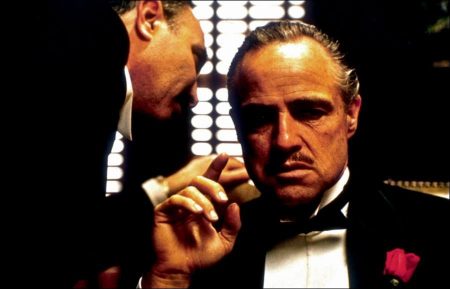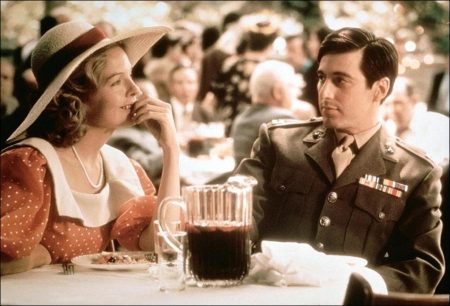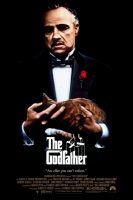Tagline: An offer you can’t refuse.
The Godfather “Don” Vito Corleone is the head of the Corleone mafia family in New York. He is at the event of his daughter’s wedding. Micheal, Vito’s youngest son and a decorated WW II Marine is also present at the wedding. Micheal seems to be uninterested in being a part of the family business.
Vito is a powerful man, and is kind to all those who give him respect but is ruthless against those who do not. But when a powerful and treacherous rival wants to sell drugs and needs the Don’s influence for the same, Vito refuses to do it. What follows is a clash between Vito’s fading old values and the new ways which may cause Micheal to do the thing he was most reluctant in doing and wage a mob war against all the other mafia families which could tear the Corleone family apart.
The Godfather is a 1972 American crime film directed by Francis Ford Coppola and produced by Albert S. Ruddy, based on Mario Puzo’s best-selling novel of the same name. It stars Marlon Brando and Al Pacino as the leaders of a fictional New York crime family. The story, spanning 1945 to 1955, chronicles the family under the patriarch Vito Corleone (Brando), focusing on the transformation of Michael Corleone (Pacino) from reluctant family outsider to ruthless mafia boss.
About The Godfather
The superb, three-part gangster saga was inaugurated with this film from Italian-American director Francis Ford Coppola, The Godfather (1972). The first two parts of the lush and grand saga are among the most celebrated, landmark films of all time. Many film reviewers consider the second part equal or superior to the original, although the first part was a tremendous critical and commercial success – and the highest grossing film of its time. This mythic, tragic film contributed to a resurgence in the American film industry, after a decade of competition from cinema abroad.
One of the original “Movie Brats” who had not had a hit after seven films, director Coppola collaborated on the epic film’s screenplay with Mario Puzo who had written a best-selling novel of the same name about a Mafia dynasty (the Corleones). The Godfather catapulted Francis Ford Coppola to directorial superstardom, and popularized the following euphemistic phrase (of brutal coercion): “I’m gonna make him an offer he can’t refuse.”
The almost three hour, R-rated saga film (for violence and graphic language) won three Oscars: Best Picture, Best Actor (Marlon Brando refused to accept the award) and Best Adapted Screenplay (Mario Puzo and Francis Ford Coppola). The other seven nominations included three for Best Supporting Actor (James Caan, Robert Duvall, and Al Pacino), Best Director, Best Sound, Best Film Editing, and Best Costume Design.
Gangster films are one of the oldest of film genres (starring Edward G. Robinson, James Cagney and Humphrey Bogart), emerging as an influential force in the early 1930s (e.g., Little Caesar (1930), Public Enemy (1931), and Scarface (1932)). This gangster film re-invented the gangster genre, elevating the classic Hollywood gangster film to a higher level by portraying the gangster figure as a tragic hero. [With the disappearance of the Production Code, retribution for the gangster’s crimes was not an automatic requirement.]
The rich and enthralling film is characterized by superb acting and deep character studies, beautiful photography and choreography, authentic recreation of the period, a bittersweet romantic sub-plot, a rich score by Nino Rota, and superbly-staged portrayals of gangster violence. Its grim, dark passages and bright exterior scenes are all part of the beautiful cinematography by Gordon Willis.
The Godfather (1972)
Directed by: Francis Ford Coppola
Starring: Marlon Brando, Al Pacino, James Caan, Richard S. Castellano, Robert Duvall, Diane Keaton, Talia Shire, Sterling Hayden, Richard Conte, Gianni Russo, John Cazale, Rudy Bond
Screenplay by: Francis Ford Coppola, Mario Puzo
Production Design by: Dean Tavoularis
Cinematography by: Gordon Willis
Film Editing by: William Reynolds, Peter Zinner
Costume Design by: Anna Hill Johnstone
Set Decoration by: Philip Smith
Music by: Nino Rota
Distributed by: Paramount Pictures
Release Date: March 24, 1972 (United States)
Views: 1414


